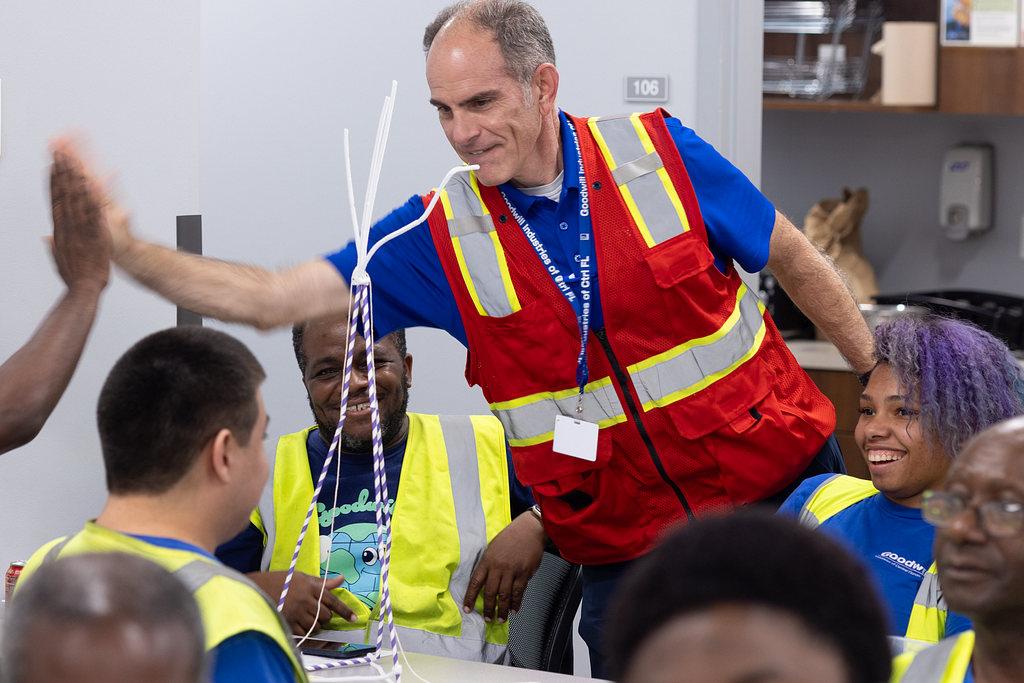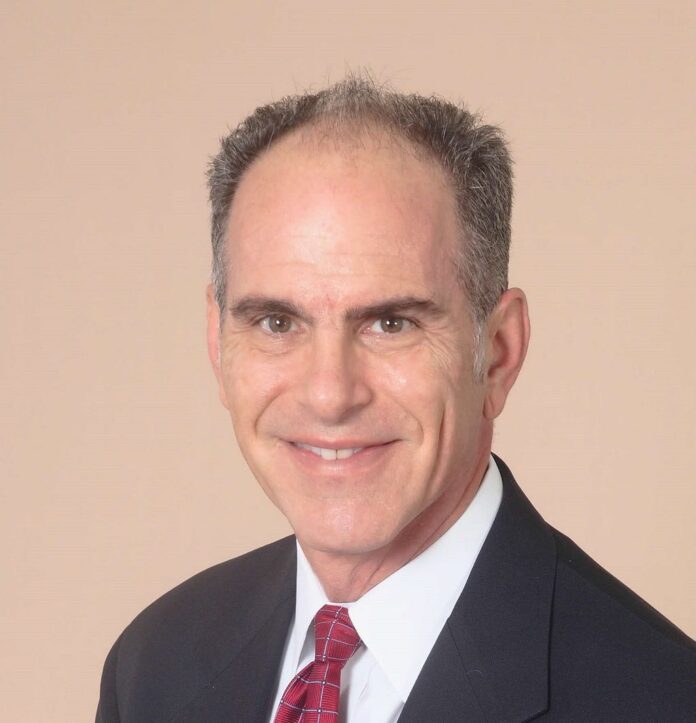Closing the Loop: George Evans Of Goodwill Industries of Central Florida On Embracing the Circular Economy
An Interview With Russell McLeod
Take great care of every donated good or in a ‘for profit’ environment, every purchased good.
In our current economic model, we see a lot of waste and inefficiency. Products are designed, used, and then discarded, often creating environmental and economic burdens. The circular economy offers a solution by designing out waste and keeping materials in use for as long as possible. This shift can lead to innovative business models, sustainability, and economic resilience. How are companies making this transition, and what can others learn from their journey? I had the pleasure of interviewing George Evans.
After graduating from James Madison University with a bachelor’s degree in business administration, George Evans began his career with Ruby Tuesday restaurants. With more than 20 years of experience leading operations, directing sales strategy, building high-performing teams and driving growth in the restaurant and food service industry, George is putting that expertise to good use for Goodwill. Wanting to make a difference professionally, George found Goodwill Industries of Central Florida (GICF) and was hired as the new Chief Operating Officer, where he’s able to further the organization’s mission of “Building Lives that Work.”
Thank you so much for doing this with us! Our readers would love to get to know you a bit better. Can you tell us your “Origin Story”? Can you tell us the story of how you grew up?
I grew up in Morgantown, West Virginia — a small college town that’s the home of West Virginia University. My parents both worked for the University for decades. My grandparents were Greek immigrants who came to the USA just prior to the Great Depression. They helped shape the way I thought about spending vs. saving money and being conscience about using vs. wasting things.
Could you share with us your journey and the pivotal moments that led you to focus on the circular economy within your business?
One thing that I’ve found similar between my prior business life in the ‘for profit’ world vs. my exciting new journey with Goodwill of Central Florida is the necessity to maximize sales and minimize waste. At Goodwill, we are truly stewards of every item that our donors generously provide. Knowing that not every item donated to us will be sold in a retail location has me constantly thinking about how we can sell as many items in the aftermarket as possible (to support our mission), recycling items like cardboard and older electronics, and ultimately keeping as many items out of the landfill as possible.
What experiences in your background have shaped your understanding and commitment to sustainable business practices?
“Going Green” was a brand promise at Ruby Tuesday in the mid to late 2000’s before most restaurants had any type of sustainability initiatives. Energy conservation — programs like ‘power up, power down’ — as well as recycling initiatives were in play even in markets like the deep South where for many companies that was an afterthought.
Can you tell us about a significant challenge you’ve faced in your career that has influenced your approach to business and sustainability?
The COVID-19 pandemic’s negative impact not only on global health but on many businesses including Ruby Tuesday and Goodwill challenged me to get teams to rethink what we wanted vs. what we needed. Jobs were at stake and without being good stewards of our resources, there was a risk of permanently eliminating jobs due to either increased risk of closing locations or having locations not bounce back from sales losses. At Goodwill of Central Florida, we were able to bounce back stronger than ever and truly support our mission of ‘Building Lives that Work’.
How has your company evolved to integrate circular economy principles, and what role have you played in this transformation?
We’ve continued to increase the number of items we keep out of landfills every year by constantly evaluating what additional items can be recycled or sold in the aftermarket. Last year we kept over 24 million pounds of material out of landfills and this year we are on pace to increase that by 5–10%.
What does ‘closing the loop’ in the circular economy mean to you, and why is it important for businesses today?
Again, I believe whether it’s in the for profit or non-profit sectors, everyone should strive to maximize sales, minimize waste and improve the quality of the jobs we create. There are too many people out there struggling to justify just ‘throwing things away’ without constantly challenging ourselves on how to re-sell or re-cycle items that are donated to us. Furniture is an item (for example) that is very difficult to recycle. As a result, we are in the process of finding partners that can either re-furbish or re-sell the furniture we are unable to sell in our retail stores or our outlets.
Does designing products to be circular increase the cost of the product? What are the challenges of balancing cost with creating a circular product that has demand?”
In the case of Goodwill Industries of Central Florida, it does not increase costs since everything we sell is a donated good. Our biggest challenge is pricing consistently and fairly across our 29 retail locations. Some customers believe everything should be ‘cheap’ because it started out as a donation. But it takes a lot of processing and production from our team members to take an item from the state of a ‘raw donation’ out to the sales floor. Most items we price at less than half of what E-bay or other online resellers price.
Can you identify the 2–3 critical mistakes companies often make when transitioning to a circular economy model?
I believe some companies overlook the big picture. To quote Stephen Covey, they aren’t ‘being with the end in mind.’ That’s to say, they may start chasing a sustainability initiative for the wrong reasons vs. creating a needed foundation and purpose of making a sustainability part of the company culture.
How does your company address the entire lifecycle of a product, from design to end-of-life, to ensure circularity?
With our mission being ‘Building Lives that Work’, our #1 goal is to maximize the value of every donation we receive. By creating very safe and desirable work environments, we maximize productivity and the number of items we can get onto our sales floor every day. Our outlets provide another way for our customers to buy donated goods at only $1.94/pound. And finally, we send as many items that aren’t sold in our retail stores and our outlets as we can to the aftermarket or recycling.
What innovative strategies has your company implemented to reduce waste and promote resource efficiency?
When we implemented lean tables into our production areas, we greatly ramped up productivity and the number of items we could move onto our sales floor. This of course helped sales, but it also reduced the amount of time donations sat in our backrooms and thus lowered the risk that these items would not sell.
What role do partnerships and collaborations play in your efforts to close the loop and create a more sustainable business model?
By creating quality jobs for our team members as well as those seeking supportive and transitional work, we can maximize the productivity in our stores and reduce waste. Our partnership with local high schools (as an example) exposes students to our business model and provides education to many people that otherwise would not have this opportunity.

What are your “5 Things You Need To Create a Successful Circular Economy Based Business”?
- Take great care of every donated good or in a ‘for profit’ environment, every purchased good.
- Create purpose in the mission for your team members and make sure that their job is one of the positive things in their life.
- Process/produce each item efficiently to the sales floor. The longer items ‘sit’, the greater the risk of an item getting damaged or losing its seasonality.
- Price items fairly.
- Be relentless about keeping items out of the landfill through aftermarket and recycling efforts.
What is one actionable step companies can take today to move closer to a circular economy model?
Think twice about every wasted item. Was it priced fairly? Was an effort made to donate it prior to throwing it away? Has the aftermarket for the item been evaluated? Does it ‘hurt’ to throw something in the trash? If not, a true ‘zero waste’ mentality is not in place.
Could you share a story of a business or leader who has inspired you in the realm of the circular economy?
Just prior to starting my journey with Goodwill Industries of Central Florida, I took a Coursera called ‘Connected Leadership’ taught by Peter Boyd, Lecturer for the Yale School of the Environment and Resident Fellow for Yale Center for Business and the Environment. He did a phenomenal job of ‘connecting’ sustainability to the business world. I highly recommend this Coursera to anyone interested in exploring this connection and how to make true in roads in the circular community within their community.
How can our readers further follow your work or your company online?
Please follow us on Instagram, Facebook, or explore our website via the following link:
Goodwill Industries of Central Florida | Building Lives That Work (goodwillcfl.org)
This was great. Thanks for taking time for us to learn more about you and your business. We wish you continued success!
About the Interviewer: Russell McLeod is an experienced business leader, social entrepreneur, and mentor. A champion of profit with purpose, the circular economy and of collaboration for positive progress.
Russell is the founder of Mightyhum a Toronto-based impact enterprise dedicated to supporting growing organizations. And, while it’s not a requirement, the Mightyhum team has a passion for collaborating with purpose-driven businesses. Mightyhum specializes in providing consulting services and turning hairy audacious concepts into achievable ventures & projects. The Mightyhum team work with C-suite executives and leaders, developing new product offerings, effective go-to-market strategies, building for profitability, and streamlining operations. Before Mightyhum, Russell was involved in the world of social enterprise as the Executive Director of ME to WE, one of Canada’s best known and most awarded social enterprises. While at ME to WE, the team demonstrated that being profitable and impactful was indeed possible. During his tenure, ME to WE delivered $20M in cash and in-kind to WE Charity, helping transform the lives of over 1 million people through access to clean water; the lives of 200,000 children with access to education; and 30,000 women-led businesses launched globally.
Russell’ personal mission is to inspire others that there is ‘a better way to do business,’ ‘that through business we can solve some of the world’s problems at the same time.’ You can follow Russell’s work at https://www.linkedin.com/in/russell-mcleod1/ or www.mightyhum.com.
Closing the Loop: George Evans Of Goodwill Industries of Central Florida On Embracing the Circular… was originally published in Authority Magazine on Medium, where people are continuing the conversation by highlighting and responding to this story.


